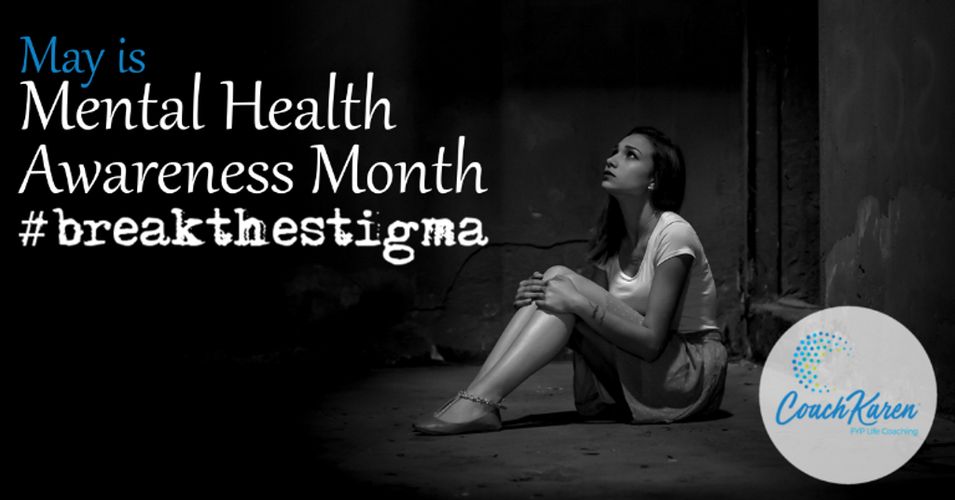May is Mental Health Awareness Month!
Mental health challenges are more common than you think. In fact, one in five adults experiences a mental illness each year. You are likely to encounter people with a mental illness in your family or in your daily life. I know I do!
What is mental health?
Our overall wellness is comprised of our physical, mental, and emotional health. Each portion effects the other.
When our mental health is in a good state, we tend to be more productive and better prepared to deal with change and adversity. We may not be in a state of bliss, but we can attend to the ins-and-outs of life with little distress.
When our mental health is compromised, we lose the ability to handle life’s difficulties effectively. While there may be more than one reason for this, a mental health disorder may be the cause.
We know their names: depression, anxiety disorders, schizophrenia, bipolar and others. The causes for these disorders are often unknown. What we do know is that mental health issues are real and treatable medical conditions. What is often overlooked, however, is that these conditions are equally important to our wellness as physical ailments.
The statistics
(List from Mental Health America)
- 1 in 5 Adults have a mental health condition. That's over 40 million Americans; more than the populations of New York and Florida combined.
- Youth mental health is worsening. Rates of youth with severe depression increased from 5.9% in 2012 to 8.2% in 2015. Even with severe depression, 76% of youth are left with no or insufficient treatment
- More Americans have access to services... Access to insurance and treatment increased, as healthcare reform has reduced the rates of uninsured adults. The greatest decrease in uninsured Adults with mental illnesses was seen in states that expanded Medicaid.
- ...But most Americans still lack access to care. 56% of American adults with a mental illness do not receive treatment. Even in Maine, the state with the best access, 41.4% of adults with a mental illness do not receive treatment.
- There is a serious mental health workforce shortage. In states with the lowest workforce, there is up to 6 affected individuals to only 1 mental health professional. This includes psychiatrists, psychologists, social workers, counselors, and psychiatric nurses combined.
Talk openly and break the stigma
Mental health challenges are very common and can impact anyone. Half of of us will experience a mental health challenge in our lifetime. Despite their universality, there is a stigma for those who experience these disorders.
Research shows that many people do not reach out for support. Unfortunately, they often don’t seek medical attention out of shame or out of a fear of being treated differently and unfairly.
We need to talk openly about mental health. By having the conversation, we alter the perception of these issues and how they’re treated.
Get the word out that people recover from mental illness all the time. Between 70% and 90% of individuals report reduced symptoms and improved quality of life when they’ve received proper support and treatment.
They need our support. The acceptance from family, friends and their communities will go a long way in ensuring that those who need help will be less afraid to seek it.
How to approach someone living with a mental health condition
(Suggestions from The National Alliance on Mental Illness)
In general:
- Build rapport by approaching them with empathy, compassion, and understanding
- Ask open-ended questions that show curiosity without judgment or telling them what to do, how to feel, and how to think.
- Listen by allowing them to talk, maintaining good eye-contact, responding in a way that helps you understand their situation.
Avoid Saying:
- “Just pray about it.”
- "You just need to change your attitude.”
- “Stop harping on the negative. You should just start living.”
- “Everyone feels that way sometimes.”
- “You have the same illness as my (whoever).”
- “Yes, we all feel a little crazy now and then.”
Actions to Avoid:
- Criticizing blaming or raising your voice at them
- Talking too much, too rapidly, too loudly
- Showing any form of hostility towards them
- Assuming things about them or their situation
- Being sarcastic or making jokes about their condition
- Patronizing them or saying anything condescending
There are many online resources with great practical advice on how to get support and how to approach someone you believe needs help. I am including a few of them below.
Please, help break the stigma of mental health issues; talk about it.
RESOURCES
https://adaa.org/mental-health-awareness-month
https://www.mhanational.org/issues/state-mental-health-america-2018
https://up2sd.org/mental-health-month/gclid=EAIaIQobChMI0IyhuYir4gIVCdRkCh29NQ1BEAAYASAAEgIVJfD_BwE
https://www.nami.org/Get-Involved/NAMI-FaithNet/Tips-For-How-to-Help-a-Person-with-Mental-Illness




















